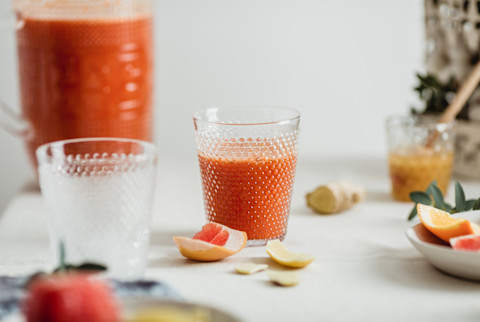The One Huge Mistake That's Making Your Smoothies Way Less Healthy

In general, I think of healthy food as something that's unique and personal—what makes your body feel best is often different from what will make mine flourish, and we should eat as such. But there are a few places I draw the line, and one of them is when I see people consuming fat-free salads or smoothies.
It's easy to do, especially in a society still fighting its way back from demonizing fat for so long. I've never seen my mom go to a restaurant and not ask for the dressing on the side before proceeding to ignore it through the entire meal, congratulating herself for saving all those calories. For smoothies, it's even easier to leave out since we tend to think of protein and fruit as the base components of the beverage, with maybe some greens for extra virtuosity.
But the fat isn't only a healthy part of smoothies and salads—it's a necessary one. That's because the very greens that you feel good about filling your plate or glass with are loaded with fat-soluble vitamins. Leah Silberman, a registered dietitian and founder of Tovita Nutrition, explains. "Many vitamins, namely the fat-soluble vitamins A, D, E, and K, require a source of fat for optimal absorption," she says. "Certain antioxidants behave similarly and become far more bioavailable when consumed in conjunction with a healthy fat. Lycopene, the abundant phytonutrient in red tomatoes, is more efficiently absorbed when both cooked and eaten with a drizzle of olive oil."
Vitamins A, D, E, and K are found in abundance in leafy greens, and if you're not eating them with fat, you're not actually getting the benefits of the nutrients.
The good news? The fix is as simple as you think. "Ensuring you're getting enough fat with your veggies is as simple as adding your favorite nuts to your leafy green salad or using an extra-virgin-olive-oil-based dressing," says Silberman. For my smoothies, I love to use ½ an avocado, some soaked nuts or seeds, hulled hemp hearts, coconut manna, dairy or nondairy yogurt, or some nut butter. For salads, I love adding skin-on chicken; using extra-virgin olive oil in my dressings; adding tahini for a creamy, bitter note; or topping everything with toasted nuts or seeds. The healthy fats in these foods also help with satiety, ensuring your smoothie or salad will actually keep you full until your next meal.
Exactly how much fat do you need to ensure you're absorbing all of those vitamins? Researchers aren't exactly clear. One study showed1 that more vitamins were absorbed with full-fat versus reduced fat dressing; R.D.s tend to advise a version of "some, but not a ton."
"I don't recommend drowning your food in oil and healthy fats but rather not being afraid to incorporate it into your meals and snacks," Silberman says. "A little (healthy) fat goes a long way!"
